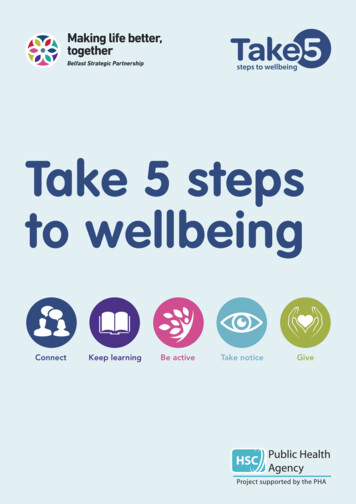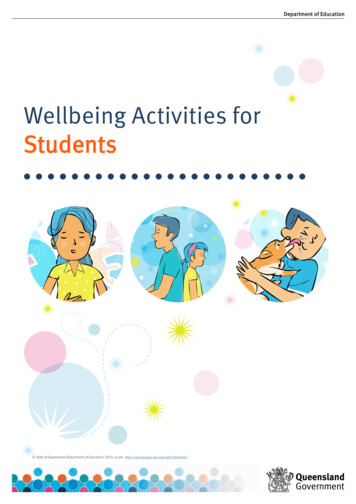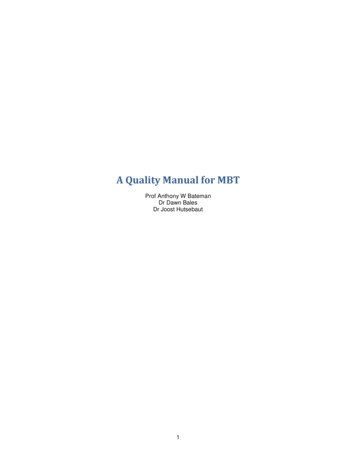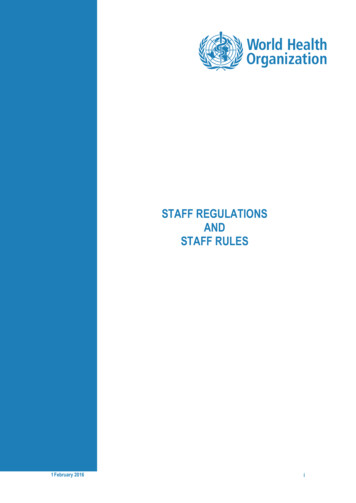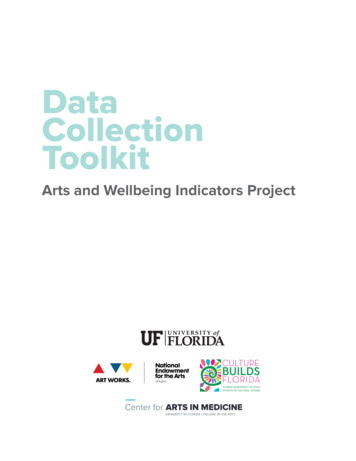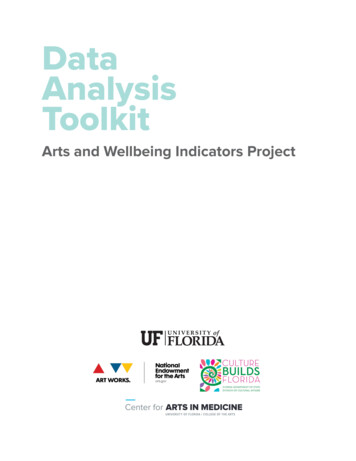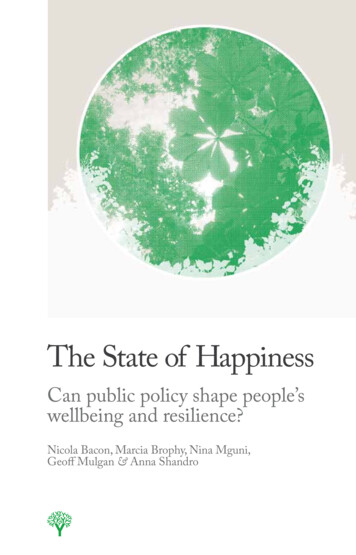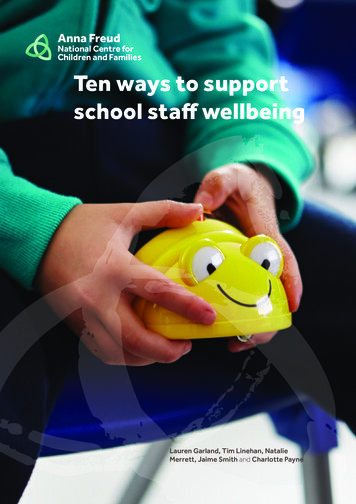
Transcription
Ten ways to supportschool staff wellbeingLauren Garland, Tim Linehan, NatalieMerrett, Jaime Smith and Charlotte Payne
ForewordAbout Anna Freud National Centrefor Children and FamiliesWho we areWhat we doOur aim is to transform current mentalhealth provision in the UK by improving thequality, accessibility and effectiveness oftreatment.We believe that every child andtheir family should be at the heart of thecare they receive, working in partnershipwith professionals.Our goal is to develop, disseminateand deliver the best possible evidencebased treatment, through scientificinnovation, research and collaboration andunderpinned by the direct experience andinsight of children and their families.Anna Freud National Centre for Childrenand Families has developed and deliveredpioneering mental health care forover 65 years.We bring together leaders inneuroscience, mental health, socialcare and education to work together toimprove understanding and practice.Our vision is a world where children andfamilies are supported effectively to buildon their strengths and to achieve theirgoals in life.Concerns about the mental health and wellbeing ofchildren and young people are currently in the publicspotlight. However, any conversation about supportingour children’s wellbeing must also include how wesupport our teachers.We must do more to support school leaders, teachersand other school staff to ensure that their mentalhealth and wellbeing is prioritised. If we don’t recognisethe importance of this we will fail not only staff, but thechildren and young people they support.The huge response that we received to thisconsultation tells us that education professionalshave much to say and share about their own wellbeingin school. We have been given the opportunity tohear about the fantastic and creative work alreadytaking place in schools all over the country. Thesecontributions give us a strong and encouragingfoundation for exploring the best way forward toensure that our schools are wellbeing schools,prioritising the mental health and wellbeing of thewhole school community.This resource is based on the views of school staffwho participated through our Schools in Mind learningnetwork and those who responded to our Teacher Tappsurvey. I would like to thank every single one of them fortheir participation. I hope that this resource providessome helpful materials and encourages schools toreflect that if they want to make a success of promotingchildren’s mental health, this can only be achieved bygiving the staff wellbeing the consideration it deserves.Our Patron: Her Royal Highness The Duchess of CambridgeThe Anna Freud Centre, operating as the Anna Freud National Centre for Children and Families, is aregistered charity, number 1077106, and a company limited by guarantee, company number 03819888.Registered addressKantor Centre of Excellence, 4-8 Rodney Street,London, N1 9JHOther addresses38 Mayton Street, London, N7 6QRPeter House, Oxford Street, Manchester, M1 5ANWebsitewww.annafreud.orgJaime SmithDirector of Mental Health and Wellbeing in Schools,Anna Freud National Centre for Children and FamiliesTelephone020 7794 2313Emailinfo@annafreud.orgTen ways to support school staff wellbeing1
IntroductionThere is no question that teachers and schoolleaders are committed to working as hard as everto support children and young people to flourishand reach their full potential. However, thecontexts they are working in can be challenging.Schools are operating in a climate of limitedresource; the hours can be long and the workloadand pressure great. As well as supporting pupilsto achieve academically, staff may encounterchildren, young people and families who areexperiencing complex issues in their lives. Theremay be serious concerns over safeguarding, andthere is some evidence to suggest an increasein the prevalence of children’s behavioural andemotional problems over recent years.1,2There is also an ethical imperative to ensureteachers and their colleagues are well supportedwhen it comes to their mental health andwellbeing. Teaching is a tough job. It can beimmensely rewarding but also physically andemotionally draining. Almost a fifth (19%) of staffwho responded to our consultation said that theirwork never has a positive impact on their mentalwellbeing. This resource draws on the views andexperiences of school staff from around thecountry to explore what makes their working liveschallenging, and to suggest some practical waysschools could help improve staff wellbeing.There are at least three reasons why it isimportant and timely to address this issue. Thefirst is that the government’s Green Paper onchildren’s mental health puts schools at the heartof promoting mental health for young people.3To achieve this, schools must first identify theneeds of staff and find out why some strugglewith the pressures of the job. Second, there is agrowing movement acknowledging the need foremployers to promote the mental health of theirstaff. Mind’s Mental Health at Work campaign,funded by The Royal Foundation, is one exampleof this. Finally, many schools face recruitment andretention issues, and the current interest in staffwellbeing provides an opportunity to look at howimproving the experience of staff might perhapscontribute to addressing these issues.About the consultationThis resource is based on a school staff wellbeingconsultation which ran in May 2018 through ourSchools in Mind learning network. Respondentswere self-selecting. The consultation approachaimed to capture the views of a large number ofschool staff over a brief time, as part of a broaderset of activities the AFNCCF is undertaking tosupport schools to become ‘wellbeing schools’.The consultation consisted of two parts:1. Working with Teacher TappDeighton, J., Lereya, T., Patalay, P., Casey, P., Humphrey, N., & Wolpert, M. (2018). Mental Health Problems in 11-14 year-olds:Results from the first HeadStart annual survey of 30,000 children. London: CAMHS Press.1Fink, E., Patalay, P., Sharpe, S., Holley, S., Deighton, J., Wolpert, M. (2015). Mental health difficulties in early adolescence: Acomparison of two cross-sectional studies in England from 2009 to 2014. Journal of Adolescent Health, 56, 502-507.2Department of Health and Department for Education (2017) Transforming Children and Young People’s Mental HealthProvision: a Green Paper t/uploads/system/uploads/attachment data/file/664855/Transforming children and young people s mental health provision.pdf32Anna Freud National Centre for Children and FamiliesTeacher Tapp is a mobile app through whichschool staff in the UK answer three questionseach day. Across three days in May 2018, weasked teachers nine closed-ended questionsrelating to staff wellbeing via the app. Eachquestion received over 2,400 responses.2. Schools in Mind consultationThrough our Schools in Mind learning network weinvited school staff, in any role, to respond to aset of open-ended questions. The online surveywas open and publicly accessible for eight daysduring May 2018. We received 684 responses tothe survey.School staff were asked to provide details ofapproaches or initiatives that have worked wellin their setting, several of which appear in thisresource as case studies, together with casestudies collected at regional Schools in Mindevents during July 2018.Quantitative data and methodological detail areincluded in Appendix B.Ten ways to support school staff wellbeing3
1Ten ways tosupport schoolstaff wellbeingEvery school is different, and when it comes tosupporting staff wellbeing what works will varyaccording to the unique environment of eachsetting. Our consultation has highlighted thediversity of approaches to supporting the mentalhealth and wellbeing of staff. We have outlinedten questions, based on the views of staff whoresponded, that schools may wish to bear in mindwhen approaching staff wellbeing. These questionsare considered in greater detail in the Thinking aboutboxes throughout this resource.23456789104Anna Freud National Centre for Children and FamiliesIs there a staff mental health lead or champion who is responsible forcoordinating the school’s approach to staff mental wellbeing, and ensuring itremains on the agenda?Is there a mental health policy that addresses the needs of staff? Is it regularlyreviewed? How is the policy embedded and communicated so that all staff areaware of it?How does the ethos of the school promote openness about mentalwellbeing, and encourage staff to feel comfortable sharing concerns?Are there opportunities for supervision to help staff feel confident they aretaking the right decisions when supporting pupils experiencing complexissues (including safeguarding and mental health, for instance)?Could supervision be offered outside of line management, for those who donot feel comfortable approaching their manager with concerns about theirmental wellbeing? Do staff know how to access external sources of support?Could measures to reduce workload or to limit hours spent working outsideof the school day be trialled – for example, by reviewing marking policies andemail protocols? Does the senior leadership team (SLT) lead by examplewhen it comes to limiting emailing at evenings and weekends?Is there a comfortable, dedicated physical space within the school wherestaff members can take time out if needed?Are there opportunities for staff to participate in activities with colleaguesthat are not linked to their work (for example social events, exercise classes,or creative groups)?Is it feasible to introduce a staff wellbeing survey, to help understand thekey issues in your school, and the impact of any measures you are taking tosupport staff wellbeing?Is the mental wellbeing of staff an agenda item at staff and governor meetings?Ten ways to support school staff wellbeing5
How does work affect school staff wellbeing?My work has a positive impact on my mental health and wellbeing:All of the timeAddressing some of these issues requires a systemicapproach, or measures that rely on additional funding.While we are mindful of the financial pressures manyschools are experiencing, respondents emphasisedthe impact that smaller scale changes could have onsupporting staff wellbeing.2%Often23%Some of the time55%Not at all19%However, it is a cause for serious concern that nearly a fifth (19%) say that their work has no positiveeffect on their mental health and wellbeing. Although this is a small-scale finding, it highlights theneed to place the mental wellbeing of the whole school community, including staff, at the heart of theschool’s agenda, to encourage staff to come forward and speak about their concerns.Key themesSeveral aspects of the job can present challenges to the mental health and wellbeing of school staff.Key among these challenges are workload and work-life balance, and concerns about pastoral issuesrelating to pupils.Have any of the following caused you to feel stressed or unhappy at work overthe last 2 weeks? (Select as many as apply)62%Workload andwork-life balance25%Relationshipwith colleagues4617%10%Relationshipwith parentsI have not felt stressedor unhappy at workover the last 2 weeks49%Accountability (e.g.performance, testscores, inspections)39%Pastoral concernsrelating to pupils(e.g. mental ionshipwith SLT75%62%Ofsted: GoodOfsted: Outstanding53%Have felt stressed or unhappy as a result ofworkload/work-life balancen 1693Most school staff said that their work has a positive impact on their mental health often or some of thetime. This is consistent with research carried out by the Institute of Education and the National Instituteof Economic and Social Research, which found that school employees in the UK express high levels of jobsatisfaction and are more committed to their organisations than employees elsewhere in the economy.4Ofsted: RequiresImprovementStaff care and supportSchool cultureRespondents emphasised the importance of feeling listened to, appreciated and understood, and thatrecognition for good work goes a long way towards making staff feel valued. Likewise, staff said thatduring particularly difficult times, acknowledgement that today must have been hard can be validating.The consultation highlighted the importance of positive relationships among colleagues, andparticularly the value of building a sense of staff ‘togetherness’. Respondents suggested various waysschools might work toward this.“I believe a highly effective, organised and supportive SLT who understand theirstaff members and adapt to meet their needs has a massive impact on staffwellbeing and mental health. Fortunately, we are lucky enough here to havethat.”SEND role, primary schoolThinking about culture and ethos»»»»»Are staff encouraged to talk about and reflect on challenging situations?Do staff feel appreciated? How do you know?Do staff have space and time at school to get to know one another? Could occasional teambreakfasts or weekly coffee and cake be organised, to encourage staff to chat informally?Are social events away from school offered, to facilitate teambuilding and help staff to feelsupported by one another when back at work?Is it feasible to offer free or low-cost activities in school such as yoga, mindfulness andsports clubs, to aid relaxation and to bring colleagues from across school places-study-revealsAnna Freud National Centre for Children and FamiliesTen ways to support school staff wellbeing7
Staff care and supportSeeking supportA small minority would seek help from their GP or a mental health professional if they felt worried orstressed at work. While this might suggest that some are able to manage with the support of family,friends and colleagues, it is crucial that all school staff are aware of the sources of professional supportavailable should they need additional help. The availability of counselling services and employeeassistance programmes (such as the one offered by Education Support Partnership) was identifiedby some as an important way to support mental wellbeing, albeit one which has resource implicationsfor schools. Respondents felt that where mental health provision is available in-school to pupils, thisshould likewise be accessible to staff.If I felt stressed or worried at work, I would be most likely to seek help from:(Select as many as apply)SchoolFriends or family62%A colleagueLine manager SLT57%32%19%Nobody GP11%MH professional8% 4%n 1664School staff draw on a range of resources when feeling stressedor worried at work. Friends and family were the source of supportidentified by the greatest number in our consultation. Over halfwould approach a colleague in a similar role, with fewer indicatingthat they would turn to their line manager or SLT. It is, perhaps,a cause for concern that 11% would not approach anyone withwork-related stress and worry.anybody if they felt stressed or worried at work.Staff said that open discussion of mental wellbeing is important in encouraging individuals to comeforward if they are struggling. 39% respondents agreed that open conversations about mentalwellbeing are encouraged in their school. While often the issues that have an impact on staff mentalwellbeing are school-related, personal life circumstances can affect staff at work (and vice versa) andrespondents felt this should be actively acknowledged.In my school, staff areencouraged to speak openlyabout their mental wellbeing.4%35%AgreeRespondents said that regular supervision separate from line management, and 1-1 or in small groups,might help them to manage the emotional impact of their work and to feel supported with seriousconcerns about the wellbeing of pupils. Complex situations relating to children’s mental health andsafeguarding can be stressful even for specialist staff, which is why support in the form of supervisionis offered to mental health specialists. The word ‘supervisor’ may suggest directing a staff member’swork, but most models of supervision also emphasise its supportive function. Supervision providesan opportunity to think about the needs of pupils or to consider an area of work the staff member isfinding especially challenging, and it can reduce the sense of being alone in dealing with a problem.Supervision is different from staff counselling. In staff counselling the staff member is the focusof the discussion, whereas in supervision the aim is to support the staff member with work tasksand challenges. However, it is recognised in supervision that stress may impact on the capacity of amember of staff to manage their work well. More information of supervision in schools can be found inour booklet: Supporting staff wellbeing in schools.11% of school staff would not approachStrongly agreeSupervisionDisagree42%Strongly disagreeN/A13% 6%While several respondents suggested supervision would be beneficial for all staff, the need for supervisionfor pastoral staff came across most strongly. Some said supervision should be led by a trained mentalhealth practitioner who is independent of the school, while others thought peer supervision would beeffective. What staff believe is crucial is feeling comfortable sharing concerns openly.Thinking about accessing support»»»n 1693»»“[For staff ] to have time to talk with their colleagues without having to rush,pretend that they’re okay, or fear how others may think, feel or act.”Are staff encouraged to talk about mental health and wellbeing, both formally and informally?Do staff feel supported when it comes to their mental wellbeing? How do you know?Do staff know how to access professional mental health support if they need it? Does yourschool share details of organisations who can provide help and support?Do you have the budget to buy counselling services or employee assistance programmes?Are there opportunities for supervision, and could supervision outside of line managementbe considered?Safeguarding lead, primary school8Anna Freud National Centre for Children and FamiliesTen ways to support school staff wellbeing9
Case studiesMeadow High School, MiddlesexLessness Heath Primary School, BexleyInvolving and empowering staffA voluntary group of staff from all teams atMeadow High School identified that theywanted greater involvement in decision makingprocesses, so working parties were set up. Theseinclude a wellbeing working party which organisesregular events for staff (usually seasonal),including:»»»»»»pancake breakfastsbriefings with cakea summer barbequefree Pilatesreduced price pamper eveningsFriday staff wellbeing box: a name is drawnfrom a box and that staff member choosesa small ‘thank you’ gift, and has a fun picturetaken which is shared with staff»»»recognition awards: staff note colleagues whoare going above and beyond, and at the endof the year there is a staff recognition awardsevening, with bronze, silver, gold and platinumawards‘thank you’ treats for support staff onNational Teaching Assistants’ Daystaff can have online shopping purchasesdelivered to the school officeResults of the school’s biannual work-life balancesurvey fed in to the development of the wellbeingworking party. The PTA donated money to fundthe various ideas.Gordon Primary School is trying to introduce anumber of small, steady, sustainable changes toembed in the school.For example, weekly yoga classes have been set upin school with a local instructor. Due to the numberattending the cost is minimal. These classes arewell attended by teaching and support staff, andthose who attend seem more ‘connected’.Staff have accessed workshops on managingstress and worry from a local service, GreenwichTime to Talk, and free training from the CharlieWaller Memorial Trust on anxiety and depression,to open up conversations around mental healthand improve understanding of difficulties.10Anna Freud National Centre for Children and FamiliesLessness Heath Primary School has placed ahuge focus on the wellbeing of the whole schoolcommunity. Emphasis has been placed on staffwellbeing to help promote teacher retention andto create happy staff for the pupils at the school.Staff supervisionThe school has found the introduction ofsupervision to be a vital strategy within itswellbeing plan. Staff in some roles have beenoffered access to clinical supervision, while themajority are offered supervision by colleagues inschool, using a coaching approach. Senior leadersprovide one-to-one reflection space for all staff.Supervision has created a space for professionalsto reflect on their systems of knowledge,attitudes, and values related to teaching, whilstproviding an insight into their professionaldevelopment.One teacher shared her view on the relationalimpact this process has had on herclassroom environment:Gordon Primary School, LondonManaging staff stressSchool staff are valuedA Learning Mentor is planning a weekly ‘open door’session after school, offering staff a place to talk.In addition, the Learning Mentor and the SENCO/Inclusion Manager plan to start monthly peersupervision groups to help staff feel less isolatedwhen dealing with challenging experiences.The school designed its own staff voicequestionnaire around mental health resiliencewith seven short questions and a box forthoughts for improvement. Staff were surveyedbefore Easter and the survey will be repeatedat the end of the school year to see if there hasbeen a change.“These sessions have facilitated asafe space for me to explore not onlythe needs of myself as a professionalbut also the needs of my pupils; ithas given me a greater insight intounconscious thoughts and feelings thatmay be acting a barriers to positiverelationships within my classroom.”School leaders have noticed that staff at LessnessHeath are taking responsibility for their personalperformance and are more able to use a solutionfocussed approach, discussing any issues thatarise within the protected supervision time. SeniorLeaders report a reduction in the number of staffcoming to them with personal issues. Staff ofcourse still have concerns sometimes, howeverthese are now often approached within the safespace supervision providesA new feedback policyLessness Heath believes that staff are itsmost valuable resource, as well as being itsmost expensive resource. The school felt thatteachers’ time could be used more efficiently, andtherefore introduced a new feedback policy underwhich teachers are no longer required to markbooks. The new policy is based on responsiveteaching. Face to face feedback adds relationalvalue and allows for teachers to be moreresponsive to pupil needs. Teachers commentthat they now have more time in the evening forself-care and spending time with their family andfriends, creating a better work-life-balance:“Our new feedback policy has given meback significant portions of my timethat I can now refocus on next stepsfor learning as well as allowing me tospend more time with my family.”Ten ways to support school staff wellbeing11
Working with pupils who are experiencing difficultiesStaff said that supporting children and young people with social, emotional and mental health (SEMH)needs, or those who are experiencing complex issues in their lives, can have a significant impact ontheir own mental wellbeing.“Supporting children through difficult times can be stressful in that it’s hard toleave it all at school when I go home. Knowing that some children are enduringhome situations which are not ideal is not easy to disengage from.”Learning mentor, primary schoolWhen difficult situations with pupils arise, some respondents said they need a moment to processwhat has happened, and that going back to teach a class directly afterwards can feel challenging. Somesuggested that a stronger focus on social and emotional skills and less pressure to achieve progresspoints, particularly for pupils with special educational needs, could benefit both staff and pupil wellbeing.Respondents highlighted the importance of clear policies on managing challenging behaviour,which are communicated and consistently implemented across the school. Some added that theseprocedures should be developed with the support of parents and carers.As well as highlighting the potential value of supervision, respondents said that easier access to externalmental health services and better links with colleagues in children’s mental health and social care wouldhelp to reduce the pressure they experience. As part of the proposals laid out in the Green Paper, weexpect that schools and colleges will be asked to identify a Designated Senior Lead for Mental Health,whose responsibilities will include oversight of a whole school approach to mental wellbeing, andknowledge of local services and referral routes for children and young people. We expect too that thegovernment will provide training programme help prepare these individuals for their new roles.5Thinking about working with pupils who are experiencing difficulties»»»Is there a space staff can go to if they need to take a moment after dealing with adifficult situation?Is there a designated mental health lead, who has knowledge of local mental health servicesand referral routes for children and young people?Are policies and strategies on challenging behaviour clear, transparent and understood by allmembers of staff? Did staff and parents/carers have input into these policies?Knowledge of and training in mental healthA smaller proportion of respondents felt that increasing the understanding of mental health across thewhole school community should be a priority. As one respondent put it, it’s important that there is anappreciation that:“Mental illness is an illness and not just a failure of the member of staff to 'keepup with the pace'.”Some said that staff training which looks at identifying and supporting pupils who are experiencingmental health difficulties would have a positive impact for staff, increasing their confidence inrecognising and responding to issues when they arise. Specific areas for training include signs thatpupils may be struggling, attachment issues, anxiety and supporting children and young people whohave experienced bereavement. Respondents also suggested that training which builds resilience instaff to deal with change and with challenging circumstances would benefit wellbeing, as would betterknowledge of external supports available to both staff and pupils.Department of Health and Department for Education (2017) Transforming Children and Young People’s Mental HealthProvision: a Green Paper t/uploads/system/uploads/attachment data/file/664855/Transforming children and young people s mental health provision.pdf512Anna Freud National Centre for Children and FamiliesAlthough training often has a cost, some helpful materials are freely available on the Mentally HealthySchools website.Ten ways to support school staff wellbeing13
Workload and work-life balance“Constantly having an endless list of jobs to do and rarely having sufficientuninterrupted time in which to complete them it makes me feel like I’mtreading water and can’t stop, which is exhausting.”Deputy head teacher, primary schoolOur consultation reflects what many reports have identified in the past – that feeling overwhelmed byquantity of work is a major source of stress for school staff, and addressing workload would make thesingle biggest contribution toward improving wellbeing.Which single initiative among the following do you feel would be the most valuableto improving your mental wellbeing at work?Increased information, training and awarenessabout staff mental wellbeing4%Peer support3%Access to occupational health/professionalmental health support4%Time off and flexible working schemesLimiting working hoursCannot answer / not relevantMore/better supervision from managersOther7%Respondents said that finding time for a break during the school day can feel difficult, but thatprotected breaks (which do not involve supervising pupils) are important in looking after their ownwellbeing. Physical space should be considered – respondents value staff rooms that are quiet andcomfortable, and some suggested an outdoor area specifically for staff would be welcomed.Thinking about workload and work-life balance»3%»7%Are marking policies regularly reviewed, with input from staff?Does the school have a guidance or protocols on working and emailing outside of school hours?Does SLT lead by example when it comes to limiting emails outside of working hours?Have staff been asked whether they think they staff room is comfortable, and what couldbe improved?n 1655“There is so much paperwork in the role now; planning, marking, assessmentladders, action plans, monitoring notes, meeting notes - it goes on. Until theexcessive workload is addressed, mental health will suffer.”This is an area that is difficult to tackle given the pressures schools are under. Yet even in thischallenging area, respondents suggested several approaches that could go some way towardimproving work-life balance and helping workload feel more manageable. For example, some schoolsare trying out new policies to lessen the quantity of marking staff are expected to undertake.Anna Freud National Centre for Children and FamiliesProtected breaks»There was an overwhelming feeling that teachers were struggling with the volume of administrativetasks they are required to undertake;14“Which parts of our job we are expected to do in school and what is meant to bedone in our own time.”Teacher, secondary school58%2%Respondents to our consultation made several suggestions to restore a healthier work-life balance.These included leaving laptops at work, and the introduction of protocols outlining the times at whichstaff are advised not to check or reply to emails. One respondent asked for greater clarity about:“More
Ten ways to support school staff wellbeing 1 Concerns about the mental health and wellbeing of children and young people are currently in the public spotlight. However, any conversation about supporting our children’s wellbeing must also include how we support our teachers. We must do
